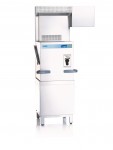Winterhalter builds the case for carbon footprinting
Catering equipment supplier speaks at Carbon Trust’s ‘Standard Bearer’ Conference
 Winterhalter talked about its experiences with carbon footprinting at a workshop held by The Carbon Trust as part of its recent Standard Bearers’ Conference, held on 12 October 2016 at 30 Euston Square, London. The Conference attracted big names including Lego, McDonald’s and GlaxoSmithKline.
Winterhalter talked about its experiences with carbon footprinting at a workshop held by The Carbon Trust as part of its recent Standard Bearers’ Conference, held on 12 October 2016 at 30 Euston Square, London. The Conference attracted big names including Lego, McDonald’s and GlaxoSmithKline.
“Many of the delegates were looking at the science behind our carbon footprinting,” says Winterhalter marketing manager Paul Crowley, who made the workshop presentation jointly with Dominic Burbridge of The Carbon Trust. “The Trust required a huge range of elements to be factored in before they could create a carbon footprint for each Winterhalter warewasher model – most of the questions from the floor focused on how those elements came together to create the footprint figure.” 
Winterhalter is the only catering equipment company to achieve carbon footprint certification through the Carbon Trust. To enable the accreditation, the Trust worked with Winterhalter to develop a calculator that buyers can use to compare the lifetime carbon footprint, and expected energy costs, of any Winterhalter model, based on their anticipated levels of actual use.
During the workshop, Crowley considered the difficulties of creating the calculator, and the benefits of carbon footprinting to equipment buyers and to Winterhalter itself, in terms of the commercial edge is has given the company.
“Any foodservice operator who is interested in sustainability and CSR immediately sees the value of our carbon footprinting,” he said. “This is a catering equipment industry first and we are very proud of it. Plus, of course, it fits with our brand’s commitment to the environment. However, there’s no doubting that it is helping, and will continue to help, in winning us business.”
Crowley says that the Conference highlighted how different industries can learn from each other in terms of tackling issues such as waste. “For example, the paint industry’s Community Repaint charity aims to make use of waste paint to decorate houses of people and organisations that need help. Maybe there’s a way for the hospitality industry to use their experience to make better use of waste food? Of course it won’t be easy to organise, but there are definitely lessons to be learnt from outside our market.”
